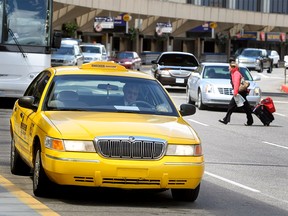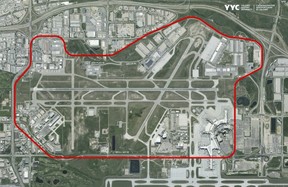Starting Jan. 15, 2024, the Calgary Airport Authority will add a $4 drop-off fee for taxis arriving at YYC

Article content
When air travellers step out of a taxi in January at Calgary International Airport, fares will be considerably more expensive — even before the car reaches the terminal.
News that the Calgary Airport Authority will introduce a new $4 inbound fee for taxis — which will be directly passed on to riders — was met with understanding from taxi operators as the authority works to recoup revenues lost during the pandemic.
Advertisement 2
Article content
Article content
“I understand what the airports are doing . . . it’s not just taxis. Every commercial operator at the airport is being hit with increases for services,” said Jeff Garland, general manager of Calgary-based Associated Cab.
Starting Jan. 15, 2024, the airport will add the $4 fee for taxis arriving at YYC, while the existing pickup fee will fall to $4.50 from $5, the agency announced Wednesday. In a Thursday statement to Postmedia, the authority said it took into account pandemic-related financial effects when it made the decision.
“There are still financial challenges that we, and many other airports, are dealing with,” it said.
Garland expects “a lot of questions” and some customer disputes over the changes, and it’s unclear how much it will affect the balance sheets of taxis. “I don’t have any doubt that it’s going to impact passenger flows . . . I don’t know what level,” he said.
The changes mean an average trip to the airport from downtown will go from the low-$40 range to nearly $50, he said.
Related Stories
-

New Calgary airport drop-off fee for arriving taxis starting in January 2024
-

Calgary airport traffic, revenue take off after pandemic lows
-

Calgary International Airport allows Uber pickups at arrivals zone
-
None
Article content
Advertisement 3
Article content
The new fee structure will reflect rates paid by users of ride-hailing vehicles including Uber and Lyft, the airport authority said in its statement, creating a more level playing field among various transportation services.
Inbound and outbound airport fees are paid for by passengers, and collected through taxi and ride-hailing operators.
The change comes less than a year after the airport authority began allowing ride-hailing drivers to make drop-offs and pickups near where taxis do.
Geofencing will monitor taxis coming in and out of airport campus
A unique feature of the new fees is it includes a large area surrounding YYC airport, meaning cabs driving to private hangars and airport hotels, for example, will be subjected to inbound and outbound fees.
The authority is working with taxi companies to implement geofencing to enforce the new fees, a technology that establishes a virtual perimeter and will notice when cabs enter the airport campus. Cabs will carry computer systems that alert the system when they enter the area.
“(The drivers are) a vessel for the airport to collect money, and that’s all that’s gonna happen. The driver collects it and the money is remitted through us to the airport,” Garland said.
Advertisement 4
Article content
The area is bounded by Aero Drive/11th Street N.E. and neighbouring properties on the west, McKnight Boulevard N.E. to the South, Barlow Trail to the east, and the airport terminal departure, arrivals and parking garage areas to the north.

Airport authority, taxis struggled during pandemic
Taxis and other private transportation companies are still attempting to recover from the severe damage the COVID-19 pandemic wrought on their finances.
Ian Lawson, a Calgary limousine broker, laid off his entire staff and sold 14 of his 15 limousines during the pandemic to make up for lost revenues.
As travel has ramped up, his fleet is back to 10. His company is preparing to pay back its small business emergency loan, due in 2024. He said many of his peers in the industry are in the same position. (Limousines pay separate, higher outbound fees.)
Meanwhile, the Calgary Airport Authority said earlier this year it’s nearing full recovery from the pandemic, with revenues this year projected to surpass pre-pandemic levels.
It still faces major costs at the hands of a $200-million restoration of the aging west runway, which is slated to be replaced in 2025. The authority said in June it was seeking additional funding from Ottawa and the province due to inflationary increases in construction costs.
— With files from Michael Rodriguez
X: @mattscace67
Article content
Originally posted 2023-11-16 23:31:40.



Comments
Postmedia is committed to maintaining a lively but civil forum for discussion and encourage all readers to share their views on our articles. Comments may take up to an hour for moderation before appearing on the site. We ask you to keep your comments relevant and respectful. We have enabled email notifications—you will now receive an email if you receive a reply to your comment, there is an update to a comment thread you follow or if a user you follow comments. Visit our Community Guidelines for more information and details on how to adjust your email settings.